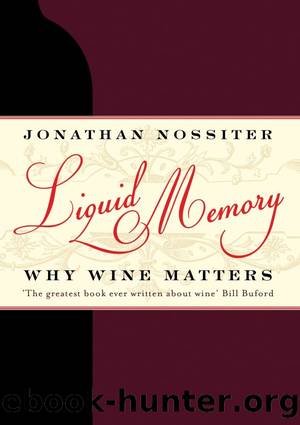Liquid Memory by Jonathan Nossiter

Author:Jonathan Nossiter
Language: eng
Format: epub
Publisher: Atlantic Books
Published: 2011-12-15T00:00:00+00:00
The Salinity of Power
More dishes arrive: Oléron clams, octopus âà la galicienne,â and tender scallops from Normandy. This marine combination is so bracing that the table pulses with saline pleasure. It occurs to me that the childlike delight weâre taking is in flavors and textures that are resolutely adult: saltiness, minerality, briny acidity. Dupont agrees that these qualities have been disparaged with pseudo-adult seriousness by the wine worldâs great demagogic infantilizers, who have indefatigably promoted the tsunami of sweet, alcohol-heavy, and acid-deficient wines characteristic of much of the United States, Australia, South Africa, and Argentina. Itâs a style of wine that has overwhelmed those previously admirable wine-producing cultures and the entire global marketplace itself in the past twenty years.
Robert Parker is considered the single most influential critic not just within the world of wine but in relation to any given field. The âemperor of wineâ as his gossipy but admiring biographer, Ellen McCoy, has dubbed him, he has pursued his taste for sweet, fat, and rich wines with a missionaryâs zeal. Through the effect of his opinions on the world marketplace, he has become a principal agent in the dissemination of this new vinous world order. When I spent the day filming with him at his blandly kitschy suburban home in rural Maryland for Mondovino in 2002, he was at the height of his powers, not coincidentally, like George W. Bush. Parkerâs virulent righteousness, also like the former presidentâs, was disarming in its bonhomie and apparent conviction. I found him genial in the immediate sense, even as his opinions horrified me, especially his dismissal of terroir as an elaborate European marketing hoax. Like Bush, his enemiesâreal and imaginedâare agents of irreconcilable otherness. This is why the notion of terroir for him is anathema. Terroir, after all, is an expression of the âotherâ rather than the âselfâ in a state of permanent renewal and requestioning. Robert Parkerâs rather primitive proclamation of the self, himself in fact, as the fulcrum of taste judgments and his demagogic belief that the proclamation of his own personal taste is of intrinsically universal value is one of the factors that has led to his astonishing global success.
Dupont points out that when Parker began his career as an autodidact wine critic in the late 1970s, he accurately gauged the extent of hypocrisy in Bordeaux, among many of the more powerful châteaux, especially their use of the 1855 classification as a screen to mask a widespread lack of rigor. Seeing himself as a Naderite consumer advocate, Parker attacked the Bordeaux status quo. But with the help of his friend the Bordeaux enological consultant Michel Rolland, he acquired such power himself over the next decades, determining the new style of Bordeaux wines that would appeal to the American and Asian consumer, that he simply replaced the old power and its abuses with his own.
Dupont laughs, commenting that food and wine critics and their power machinations are an old story. âAfter the war, most of the gastronomic critics in France were exâNazi collaborators.
Download
This site does not store any files on its server. We only index and link to content provided by other sites. Please contact the content providers to delete copyright contents if any and email us, we'll remove relevant links or contents immediately.
| Buying Guides | Cellars |
| Champagne | Collecting |
| Spirits | Whiskey |
| Wine | Wine Pairing |
| Wine Tasting |
World's Best Whiskies by Dominic Roskrow(42446)
101 Whiskies to Try Before You Die by Ian Buxton(42445)
Whiskies Galore by Ian Buxton(40873)
Craft Beer for the Homebrewer by Michael Agnew(17488)
Right Here, Right Now by Georgia Beers(3533)
Not a Diet Book by James Smith(2769)
Water by Ian Miller(2617)
The Coffee Dictionary by Maxwell Colonna-Dashwood(2566)
Kitchen confidential by Anthony Bourdain(2345)
Coffee for One by KJ Fallon(2034)
Smuggler's Cove: Exotic Cocktails, Rum, and the Cult of Tiki by Martin Cate & Rebecca Cate(2015)
Beer is proof God loves us by Charles W. Bamforth(1955)
Superfood Smoothie Bowls: Delicious, Satisfying, Protein-Packed Blends that Boost Energy and Burn Fat by Chace Daniella(1937)
Talking as Fast as I Can by Lauren Graham(1872)
Bourbon: A Savor the South Cookbook by Kathleen Purvis(1820)
A Short History of Drunkenness by Forsyth Mark(1747)
Eat With Intention by Cassandra Bodzak(1712)
Cocktails for the Holidays by Editors of Imbibe magazine(1652)
Colombia Travel Guide by Lonely Planet(1645)
